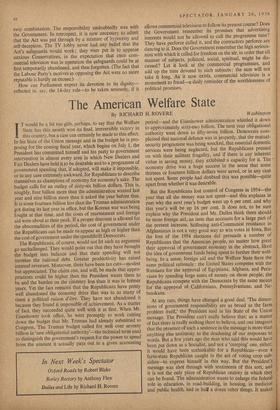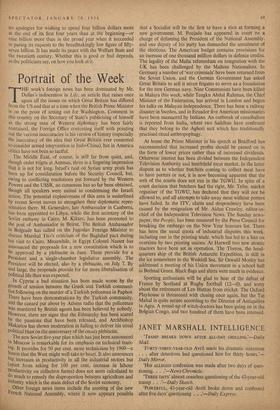The American Welfare State
IT would be a bit too glib, perhaps, to say that the Welfare State has this month won its final, irreversible victory in this country, but a case can certainly be made to this effect. In his State of the Union message and in the budget he is pro- posing for the coming fiscal year, which begins on July 1, the President has committed himself and his party to government intervention in almost every area in which New Dealers and Fair Dealers have held it to be desirable and to a programme of government spending that, if adopted, will make it impossible, or in any case extremely awkward, for Republicans to describe themselves as champions of economy for economy's sake. The budget calls for an outlay of sixty-six billion dollars. This is, roughly, four billion more than the administration wanted last year and nine billion more than it asked the year before that. It is some fourteen billion less than the Truman administration got during its last year in office, but the Korean war was being fought at that time, and the costs of rearmament and foreign aid were about at their peak. If a proper discount is allowed for the abnormalities of the period, the cost of government under the Republicans can be made to appear as high or higher than the cost of government under the spendthrift Democrats. The Republicans, of course, would not let such an argument go unchallenged: They would point out that they have brought the budget into balance and that their spending will not increase the national debt. Greater productivity has raised internal revenues. Moreover, there have been tax cuts—modest but appreciated. The claim can, and will, be made that appro- priations could be higher than the President wants them to be and the burden on the citizenry less than it was in former years. Yet the fact remains that the Republicans have pretty well abandoned the economy drive that was to so many of them a political raison d'etre. They have not abandoned it because they found it impossible df achievement. As a matter of fact, they succeeded quite well with it at first. When Mr. Eisenhower took office, he went promptly to work cutting down the budget that Mr. Truman had already submitted to Congress. The Truman budget called for well over seventy billion in 'new obligational authority'—the technical term used to distinguish the government's request for the power to spend from the amount it actually pays out in a given accounting period—and the Eisenhower administration whittled it down to approximately sixty-two billion. The next year obligational authority went down to fifty-seven billion. Democrats com- plained that national defence was in jeopardy, that the mutual- Security programme was being wrecked, that essential domestic services were being neglected. but the Republicans pressed on with their militant frugality, and if there is any inherent virtue in saving money, they exhibited• a capacity for it. The economy drive was a huge success in the sense that some thirteen or fourteen billion dollars were saved, or in any case not spent. Some people had doubted this was possible—quite apart from whether it was desirable.
But the Republicans lost control of Congress in 1954—the year that all the money was not spent—and this explains in part why the next year's budget went up 6 per cent. and why this year's will be up 16 per cent. It does not, to be sure explain why the President and Mr. Dulles think there should be more foreign aid, an item that accounts for a large part of the present increase. Stiffening anti-Communist resistance in Afghanistan is not a very good way to win votes in Iowa. But the loss of the 1954 elections did persuade a number of Republicans that the American people, no matter how great their approval of government economy in the abstract, liked the idea of government funds being spent to further their well- being. In a sense, foreign aid and the Welfare State Have the same political rationale : the United States competes with the Russians for the approval of Egyptians, Afghans. and Peru- vians by spending large sums of money on those people; the Republicans compete with the Democrats by the same means ' for the approval of Californians, Pennsylvanians. and Ne- braskans.
At any rate, things have changed a good deal. 'The dimen- sions of government responsibility are as broad as the farm problem itself,' the President said in his State of the Union message. The President can't really believe that: as a matter of fact there is really nothing there to believe, and one imagines that the presence of such a sentence in the message is more than anything else testimony to the deadening of our responses to words. But a few years ago the man who said this would have been put down as a Socialist, and not a 'creeping' one, either; it would have been unthinkable for a Republican—even a farm-state Republican caught in the act of voting crop sub- sidies—to express himself in this way. But the President's message was shot through with sentiments of this sort, and it is not the only piece of Republican oratory in which they can be found. The administration wants to enlarge the federal role in education, in road-building, in housing, in medicine and public health, and in halt a dozen other things. It makes no apologies for wishing to spend four billion dollars more at the• end of its first four years than at the beginning—or nine billion more than in the proud year when it succeeded in paring its requests to the breathtakingly low figure of fifty- seven billion. It has made its peace with the Welfare State and the twentieth century. Whether this is good or bad depends, as the politicians say, on how you look at it.



































 Previous page
Previous page